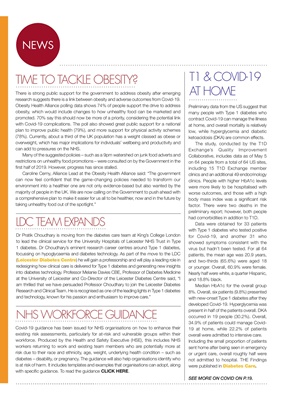
NEWS
TIME TO TACKLE OBESITY?
There is strong public support for the government to address obesity after emerging
research suggests there is a link between obesity and adverse outcomes from Covid-19.
Obesity Health Alliance polling data shows 74% of people support the drive to address
obesity, which would include changes to how unhealthy food can be marketed and
promoted. 70% say this should now be more of a priority, considering the potential link
with Covid-19 complications. The poll also showed great public support for a national
plan to improve public health (79%), and more support for physical activity schemes
(78%). Currently, about a third of the UK population has a weight classed as obese or
overweight, which has major implications for individuals' wellbeing and productivity and
can add to pressures on the NHS.
Many of the suggested policies - such as a 9pm watershed on junk food adverts and
restrictions on unhealthy food promotions - were consulted on by the Government in the
first half of 2019. However, progress has since stalled.
Caroline Cerny, Alliance Lead at the Obesity Health Alliance said: "The government
can now feel confident that the game-changing policies needed to transform our
environment into a healthier one are not only evidence-based but also wanted by the
majority of people in the UK. We are now calling on the Government to push ahead with
a comprehensive plan to make it easier for us all to be healthier, now and in the future by
taking unhealthy food out of the spotlight."
Preliminary data from the US suggest that
many people with Type 1 diabetes who
contract Covid-19 can manage the illness
at home, and overall mortality is relatively
low, while hyperglycemia and diabetic
ketoacidosis (DKA) are common effects.
The study, conducted by the T1D
Exchange's Quality Improvement
Collaborative, includes data as of May 5
on 64 people from a total of 64 US sites,
including 15 T1D Exchange member
clinics and an additional 49 endocrinology
clinics. People with higher HbA1c levels
were more likely to be hospitalised with
worse outcomes, and those with a high
body mass index was a significant risk
factor. There were two deaths in the
preliminary report; however, both people
had comorbidities in addition to T1D.
Data were obtained for 33 patients
with Type 1 diabetes who tested positive
for Covid-19, and another 31 who
showed symptoms consistent with the
virus but hadn't been tested. For all 64
patients, the mean age was 20.9 years,
and two-thirds (65.6%) were aged 18
or younger. Overall, 60.9% were female.
Nearly half were white, a quarter Hispanic,
and 18.8% black.
Median HbA1c for the overall group
8%. Overall, six patients (9.8%) presented
with new-onset Type 1 diabetes after they
developed Covid-19. Hyperglycemia was
present in half of the patients overall. DKA
occurred in 19 people (30.2%). Overall,
34.9% of patients could manage Covid19 at home, while 22.2% of patients
overall were admitted to intensive care.
Including the small proportion of patients
sent home after being seen in emergency
or urgent care, overall roughly half were
not admitted to hospital. THE Findings
were published in Diabetes Care.
SEE MORE ON COVID ON P.XX
T1 & COVID-19
AT HOME
Covid-19 guidance has been issued for NHS organisations on how to enhance their
existing risk assessments, particularly for at-risk and vulnerable groups within their
workforce. Produced by the Health and Safety Executive (HSE), this includes NHS
workers returning to work and existing team members who are potentially more at
risk due to their race and ethnicity, age, weight, underlying health condition - such as
diabetes - disability, or pregnancy. The guidance will also help organisations identify who
is at risk of harm. It includes templates and examples that organisations can adopt, along
with specific guidance. To read the guidance CLICK HERE.
NHS WORKFORCE GUIDANCE
Dr Pratik Choudhary is moving from the diabetes care team at King's College London
to lead the clinical service for the University Hospitals of Leicester NHS Trust in Type
1 diabetes. Dr Choudhary's eminent research career centres around Type 1 diabetes,
focussing on hypoglycaemia and diabetes technology. As part of the move to the LDC
(Leicester Diabetes Centre) he will gain a professorship and will play a leading role in
redesigning how clinical care is delivered for Type 1 diabetes and generating new insights
into diabetes technology. Professor Melanie Davies CBE, Professor of Diabetes Medicine
at the University of Leicester and Co-Director of the Leicester Diabetes Centre said, "I
am thrilled that we have persuaded Professor Choudhary to join the Leicester Diabetes
Research and Clinical Team. He is recognised as one of the leading lights in Type 1 diabetes
and technology, known for his passion and enthusiasm to improve care."
LDC TEAM EXPANDS